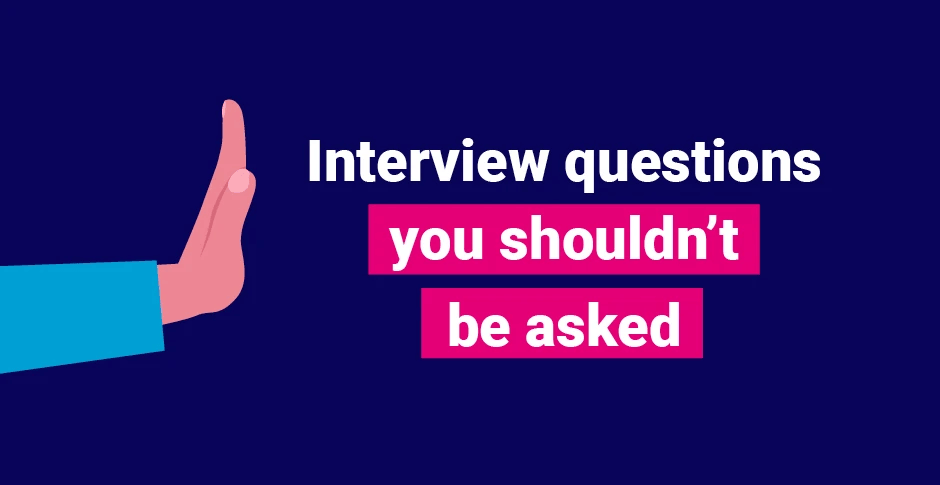Career Tips
The Interview Questions Employers Shouldn’t Ask You

Before you go to an interview, you should be aware of the questions that recruiters and employers should not ask you.
Employers use job interviews to determine your suitability for a position, and the interview is an excellent time to discuss your abilities and expertise.
However, there are certain limitations on what employers can or should ask you. Here’s what you should know.
What is acceptable for employers to ask?
A job interview is intended to help employers in determining whether or not you are the best candidate for a position. According to Trent Hancock, Principal of Jewell Hancock Employment Lawyers, this means that the questions you’re asked should be directly or indirectly related to your ability to perform the role..
“While questions about certain personality traits that may be relevant to the role are understandable, for example, ‘How do you deal with stressful situations at work?’, questions about irrelevant personal attributes are not, for example, ‘Do you suffer from any mental health issues?’,” Hancock says.
It all comes back to what information they’re seeking and why, he explains. “The distinction lies in the motive behind the question being asked and the relevance of the information the interviewer is trying to obtain.”
Questions that employers can’t legally ask
In Victoria, the Equal Opportunity Act 2010 (Vic) provides that a person mustn’t request or require someone to supply information that could be used to form the basis of discrimination, Hancock says.
“This means that employers in Victoria cannot ask questions about a candidate’s personal attributes if they are irrelevant to the role being applied for.”
A personal attribute includes for example questions about your age, gender, ethnicity or sexuality. “The reason you cannot be asked to supply information about these attributes in Victoria is because usually they have no bearing on your ability to perform the role,” Hancock adds.
While other Australian states and territories may not have a similar prohibition, Hancock adds that it is illegal for an employer to use information obtained during an interview process to then discriminate against you on the basis of race, color, sex, sexual orientation, age, physical or mental disability, marital status, family or carer’s responsibilities, pregnancy, religion, political opinion, national extraction, or social origin under the Fair Work Act 2009.
“The right not to be discriminated against doesn’t just apply to existing employees,” he says. “It also extends to “prospective employees” such as job candidates and ensures that they are not denied job opportunities for discriminatory reasons.”
This means that most questions about irrelevant personal attributes should be off limits. For example, the following questions will usually be unreasonable in most interviews:
- Are you in a same-sex relationship?
- How old are you?
- What’s your ethnic background?
- What religion are you?
- Are you pregnant or planning to start a family?
- Who do you vote for?
- Do you have a physical or mental disability?
“In most cases, the answer to these questions will not shed any light whatsoever on your ability to actually do the job,” Hancock says. “Therefore, the fact that these questions are even being asked by an employer can suggest an intent or desire to discriminate and should therefore be avoided.”
Are there exceptions?
There is a broad exemption to this general rule if the information is sought because it is reasonably required for a non-discriminatory purpose.
“For example, if a person was applying for a role at a warehouse that required heavy lifting, it would be lawful and reasonable for the employer to ask about any physical disability that might impact your ability to perform that heavy lifting,” Hancock says.
“In this scenario, the question about the personal attribute goes directly to your ability to perform the role and is therefore reasonable.”
What you can do if you’re asked a question that you think may lead to discrimination
Even if a question seems off-limits to you, it can be difficult to refuse to answer when you’re hungry for the position.
Responding in a way that redirects the conversation may help. “If an interviewer steps out of line and asks a question that could potentially lead to discrimination, politely respond that you do not believe that the answer is relevant to your ability to perform the role,” Hancock says. Depending on how the question was asked, this might be as simple as saying, ‘I’m interested to know how that relates to the role. Can you tell me a little more?’
“Ideally, this response will cause the interviewer to realise their misstep and withdraw the question. You can also use it as an opportunity to pivot the conversation towards the strengths that you do have that are actually relevant to the role”.
By sensitively responding to what you think is a discriminatory question, it may also encourage the interviewer to explain why they think the question is relevant to the role. It may be that the question is required for a non-discriminatory reason.
However, as an employee or potential employee, you should never feel pushed to answer a question that asks you to provide information that could be used to discriminate and has no direct impact on your ability to do the task.
Hancock advises you to remain firm if you’re asked plainly biased questions and know that you can sue a prospective employer for interview discrimination.
Finally, everything an employer asks you during an interview should be related to the job and your suitability for it. It might be awkward to decline or sidestep a question, but knowing what is off-limits and having a simple response prepared can help you feel more confident and in charge.






















